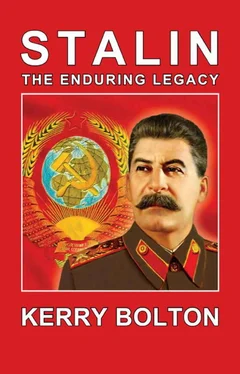The primary raison d’etre of Marxism for Trotsky personally seems to have been the destruction of religion and of family (as it was for Marx). [35] K R Bolton, ‘The Psychopathology of the Left’, Ab Aeterno, No. 10, Jan,-March 2012, Academy of Social and Political Research (Athens), Paraparaumu, New Zealand. The discussion on Marx and on Trotsky show their pathological hatred of family.
Hence, the amount of attention Trotsky gives to lamenting the return to traditional family relations under Stalin:
The revolution made a heroic effort to destroy the so-called ‘family hearth’◦– that archaic, stuffy and stagnant institution in which the woman of the toiling classes performs galley labor from childhood to death. The place of the family as a shut-in petty enterprise was to be occupied, according to the plans, by a finished system of social care and accommodation: maternity houses, creches, kindergartens, schools, social dining rooms, social laundries, first-aid stations, hospitals, sanatoria, athletic organizations, moving-picture theaters, etc. The complete absorption of the housekeeping functions of the family by institutions of the socialist society, uniting all generations in solidarity and mutual aid, was to bring to woman, and thereby to the loving couple, a real liberation from the thousand-year-old fetters. Up to now this problem of problems has not been solved. The forty million Soviet families remain in their overwhelming majority nests of medievalism, female slavery and hysteria, daily humiliation of children, feminine and childish superstition. We must permit ourselves no illusions on this account. For that very reason, the consecutive changes in the approach to the problem of the family in the Soviet Union best of all characterize the actual nature of Soviet society and the evolution of its ruling stratum. [36] L Trotsky, The Revolution Betrayed, op. cit., ‘The Thermidor in the Family’.
Marxism, behind the façade of women’s emancipation, ridicules the traditional female role in the family as ‘galley labour’, but does so for the purpose of delivering women to the ‘galley labour’ of the Marxist state. The Marxist solution is to take the child from the parents and substitute parental authority for the State via childcare. As is apparent today, the Marxist ideal regarding the family and children is the same as that of big capitalism. It is typical of the manner by which Marxism, including Communism, converges with plutocracy, as Spengler pointed out soon after the 1917 Revolution in Russia. [37] ‘There is no proletarian, not even a communist, movement that has not operated in the interests of money, in the directions indicated by money, and for the time permitted by money◦– and that without the idealist amongst its leaders having the slightest suspicion of the fact’. Oswald Spengler, The Decline of The West (London: George Allen and Unwin, 1971),Vol. II, 402.
Trotsky states, ‘you cannot “abolish” the family; you have to replace it’. The aim was to replace the family with the state apparatus: ‘During the lean years, the workers wherever possible, and in part their families, ate in the factory and other social dining rooms, and this fact was officially regarded as a transition to a socialist form of life’. Trotsky decries the reversal by Stalin of this subversion of the family hearth: ‘The fact is that from the moment of the abolition of the food-card system in 1935, all the better placed workers began to return to the home dining table’. Women as mothers and wives were returning to the home rather than being dragooned into factories, Trotsky getting increasingly vehement at these reversals of Marxism:
Back to the family hearth! But home cooking and the home washtub, which are now half shamefacedly celebrated by orators and journalists, mean the return of the workers’ wives to their pots and pans that is, to the old slavery. [38] L Trotsky, op. cit.
The original Bolshevik plan was for a new slavery where all would be bound to the factory floor regardless of gender, a now familiar aim of global capitalism, behind the façade of ‘equality’. Trotsky lamented that the rural family was even stronger: ‘The rural family, bound up not only with home industry but with agriculture, is infinitely more stable and conservative than that of the town’. There had been major reversals in the collectivisation of the peasant families: they were again obtaining most of their food from private lots rather than collectivised farms, and ‘there can no longer be any talk of social dining rooms’. ‘Thus the midget farms, [were] creating a new basis for the domestic hearthstone…’ [39] Ibid.
The pioneering of abortion rights by the Leninist regime was celebrated as a great achievement of Bolshevism, which was, however, reversed by Stalin with the celebration instead of motherhood. In terms that are today conventional throughout the Western world, Trotsky stated that due to the economic burden of children upon women,
…It is just for this reason that the revolutionary power gave women the right to abortion, which in conditions of want and family distress, whatever may be said upon this subject by the eunuchs and old maids of both sexes, is one of her most important civil, political and cultural rights. However, this right of women too, gloomy enough in itself, is under the existing social inequality being converted into a privilege. [40] Ibid.
The Old Bolsheviks demanded abortion as a means of ‘emancipating women’ from children and family. One can hardly account for the Bolshevik attitude by an appeal to anyone’s ‘rights’ (sic). The answer to the economic hardship of childbearing was surely to eliminate the causes of the hardship. In fact, this was the aim of the Stalinists, Trotsky citing this in condemnation:
One of the members of the highest Soviet court, Soltz, a specialist on matrimonial questions, bases the forthcoming prohibition of abortion on the fact that in a socialist society where there are no unemployed, etc., etc., a woman has no right to decline ‘the joys of motherhood’. [41] Ibid.
On June 27 1936 a law was passed prohibiting abortion, which Trotsky called the natural and logical fruit of a ‘Thermidorian reaction’. [42] Ibid.
The redemption of the family and motherhood was damned perhaps more vehemently by Trotsky than any other aspect of Stalinism as a repudiation of the ‘ABCs of Communism’, which he stated includes ‘getting women out of the clutches of the family’.
Everybody and everything is dragged into the new course: lawgiver and litterateur, court and militia, newspaper and schoolroom. When a naive and honest communist youth makes bold to write in his paper: ‘You would do better to occupy yourself with solving the problem how woman can get out of the clutches of the family’, he receives in answer a couple of good smacks and◦– is silent. The ABCs of Communism are declared a ‘leftist excess’. The stupid and stale prejudices of uncultured philistines are resurrected in the name of a new morale. And what is happening in daily life in all the nooks and corners of this measureless country? The press reflects only in a faint degree the depth of the Thermidorian reaction in the sphere of the family. [43] Ibid.
A ‘new’ or what we might better call traditional ‘morale’ had returned. Marriage and family were being revived in contrast to the laws of early Bolshevik rule:
The lyric, academical and other ‘friends of the Soviet Union’ have eyes in order to see nothing. The marriage and family laws established by the October revolution, once the object of its legitimate pride, are being made over and mutilated by vast borrowings from the law treasuries of the bourgeois countries. And as though on purpose to stamp treachery with ridicule, the same arguments which were earlier advanced in favor of unconditional freedom of divorce and abortion◦– ‘the liberation of women’, ‘defense of the rights of personality’, ‘protection of motherhood’◦– are repeated now in favor of their limitation and complete prohibition. [44] Ibid.
Читать дальше












